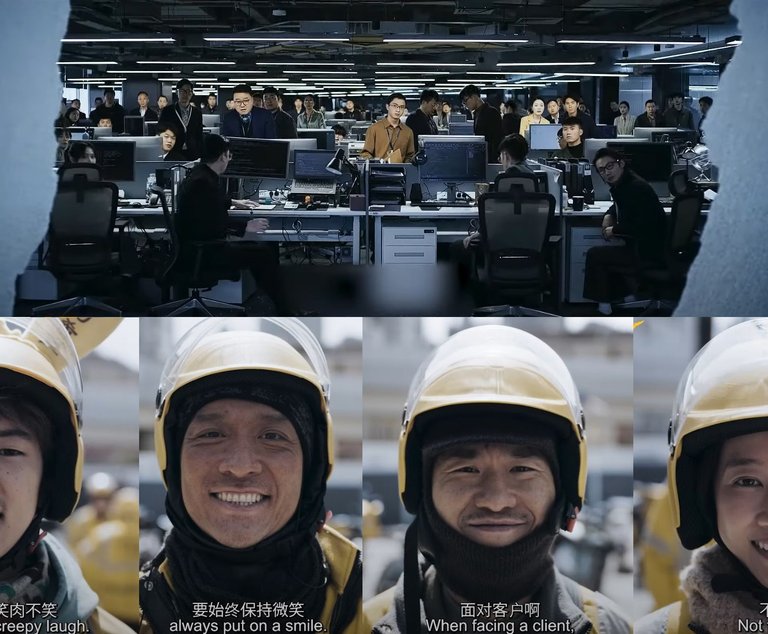NOOB FILM REVIEW - UPSTREAM directed by Zheng Xu (Netflix)

SYNOPSIS:
After losing his white collar job, a father falls into a harsh and competitive world of gig work when he starts working for a food delivery app.
REVIEW: OF COLORS
This drama, inspired by a book (I tried googling and watching the credits, but I could not find which book), strikes me as a well-written film.
In the age where a guy with one computer can mimic the look of multi-studio production of Dune 2, how your film looks is secondary. It is what that particular 'look' is saying. That is more important.
In this film, what is obvious is the use of colors, especially its grading and temperature, in this case, the warm and cold colors. The cold colors of blues are mostly used to represent the absence of humanity in places like offices full of machines and computers, where the protagonist was inhumanely sacked after years of service.
Compared to the warmth of yellow when he arrives at the food delivery office, which indicates humanity and empathy (cleverly shown with facial shots of each of the riders of unique characters). If you watch the credit to the end, there is a scene where the protagonist rides his bike into the beam of sunlight, which symbolized his success in overcoming his challenges.
THE HEROES JOURNEY
This might be a cliche take when anyone speaks of a character, but it is also something that most overlook when writing about one. But in this film, the protagonist's journey of up and down has been nicely written so the audience can relate, empathize, and sympathize.
It does not require an overly soap-opera melodramatic scene where the protagonist cries out loud and sad tunes playing in the background, which takes me to the next point.
CINEMA
There is a clear line when one speaks of the difference between a normal movie and cinema. One factor that I consider is when a film shows instead of telling.
In this film, after the protagonist's successful run at the end, his family is shown living in the street instead, while the husband should've been able to pay the overdue mortgage. Instead, it shows despite a turn of event, they're still together as a family.
No need to brag about it in dialogues. Just show it. That is cinema.
CHARACTER
The circle of the Hero's Journey needs to be completed. Here, it has turn a full circle, from hitting rock bottom midway to beating all odds not through the use of 'deus ex machina' but by the use of the character's strength.
He uses his expertise in apps and adapts them to maximize his intake in daily delivery. To lift the character higher, the writer made him share his advantage with the rest of his colleagues.
Near the end there is a scene where another big app company interested in hiring him due to the popularity of his updated delivery app. One might think he took the offer with the credit scene showing him finally doing the dance not in the street but in a new house. And like I've mentioned before, if you watch the credit further, it shows the protagonist riding into the sunlight, meaning that he did not take that offer and stays with the same delivery company.
It shows a character with integrity. No need to have a scene with him shouting and screaming cliche speech with a patriotic soundtrack playing in the background.
It is a simple story. Shown in a great way. No need to rush to build a 'universe' when you cannot write one good film.
WHAT IT IS SAYING
Beyond all the drama on the surface, it is really a commentary on modern work culture and the socio-economics. The office working environment has always had the social perception of sitting 'higher' if, in this case, compared to working as a delivery rider
(which also earns no less of an honest living).
This film has changed that perception through the subtlety of storytelling.
A cold (depicted in the use of color) machine-like environment versus the warmth of yellows when showing the shots of humanity around the scene in the delivery company.
A tale of modern living saying that no matter where you are in time, there are always highs and lows and we should be Absurdist enough to say like Pyanhabib Rahman said it 'Kita Mesti Terus Hidup!' (We have to keep on living) and give thanks.
Congratulations @nazirullsafry! You received a personal badge!
You can view your badges on your board and compare yourself to others in the Ranking
Check out our last posts:
Wonderful creation 🎨